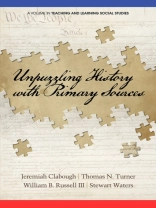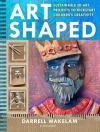Recent advances in technology have created easy access for classroom teachers and students alike to a vast store of primary sources. This fact accompanied by the growing emphasis on primary documents through education reform movements has created a need for active approaches to learning from such sources. Unpuzzling History with Primary Sources addresses this need. It looks at the role that primary sources can play in a social studies curriculum in the 21st century. Each chapter deals with a different aspect of teaching primary sources.Each chapter includes a discussion of key issues, model activities, and resources for upper elementary through high school teachers. A model lesson plan also appears at the end of most chapters. Chapter one presents a unique perspective on the nature of history and primary sources. This is followed by chapters on how historical thinking and inquiry relate to primary sources.Other chapters deal with individual types of primary sources. A glance at the table of contents will certainly draw the teacher’s interest regardless of teaching style. The skills that students gain from working with primary sources prepare them for the many responsibilities and duties of being a citizen in a democracy. Therefore, the book closes with a chapter pointing to the relationship of primary sources to citizenship education. This book will be useful as a resource for teachers and might serve as a text for inservice, college methods courses, and school libraries. All four authors have experience in the K12 classroom as well as social studies teacher education.
Jeremiah Clabough & William B Russell
Unpuzzling History with Primary Sources [EPUB ebook]
Unpuzzling History with Primary Sources [EPUB ebook]
Dieses Ebook kaufen – und ein weitere GRATIS erhalten!
Format EPUB ● Seiten 137 ● ISBN 9781681232881 ● Herausgeber Jeremiah Clabough & William B Russell ● Verlag Information Age Publishing ● Erscheinungsjahr 2015 ● herunterladbar 3 mal ● Währung EUR ● ID 5984095 ● Kopierschutz Adobe DRM
erfordert DRM-fähige Lesetechnologie












